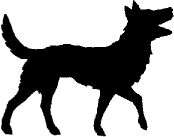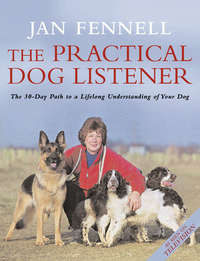
Полная версия
A Dog’s Best Friend: The Secrets that Make Good Dog Owners Great
I had gleaned so much from listening and watching other people and their dogs. But as I began to use my new-found knowledge, I was certain there was plenty more to learn, both from the present and the past. And I wasn’t wrong.

LIVING IN THE REAL WORLD
Why great owners know their limits
It goes without saying that most owners want the best for their dogs. It is the most natural thing in the world to want to provide your pet with as happy, contented and fulfilling a life as you possibly can. Yet life, as we all know, is never that straightforward. We have our dreams but real life has a habit of getting in the way of them and when that happens, we are faced with some stark choices.
In my view, the way owners respond to the realities of dog ownership defines them as clearly as anything else. The really great owners I’ve met have all had a strong sense of the limitations they face. I have come across many outstanding people in this respect, but few were more impressive than Terry and Sandra, a couple I met at the very beginning of my career as a ‘dog listener’.

Terry and Sandra lived in a village near the Humber Bridge, a short drive from my home back in the 1990s, the small town of Winterton, in North Lincolnshire. They had been having severe problems with their crossbred dog Guinness and had heard of me from friends in the area. ‘We’re very concerned about him,’ Terry said when he telephoned me. ‘If we can’t improve his behaviour we’re afraid it’s going to end badly.’
When I went to visit them, I was still working full time for the local social services department. I had formulated my method and had helped a few people improve their dogs’ behaviour, but the idea of doing it professionally had not really occurred to me. My encounter with Guinness almost persuaded me to give up before I’d really started.
Terry and Sandra had got Guinness from a rescue centre, where he’d arrived as one of three abandoned puppies. When he first moved in at the age of ten weeks, he had been lively but manageable. Now, at the age of two and a half, Guinness was a giant of a dog. He must have weighed ten stone and was so massive you could have put a saddle on him. He was one of the most obvious examples of an Alpha Male dog I had ever encountered. No one was going to tell him what to do.
Terry and Sandra reeled off incident after incident in which Guinness had refused to listen to them. If they told him to sit, he would stand there looking at them with disdain written all over his face. If they told him to leave a room he would stand firm. When he was younger, Terry had been able physically to remove him. He was now so big and powerful, even that option was no longer available.
He was equally stubborn when he wanted something from them. Guinness would routinely take hold of Terry or Sandra’s trouser leg or shirtsleeve and try to drag them in the direction of whatever it was he wanted. Their protests were usually in vain and both had got used to caving in.
They had both owned dogs in the past and knew this was a situation that just couldn’t go on. But nothing they did seemed to help. Guinness had been taken to training classes locally but he had grabbed the trainer’s arm with such force they were told he was ‘too stupid’ to be trained. Terry and Sandra were loving owners and they thought the world of Guinness. But he was already aggressive towards strangers, squaring up to them and barking loudly in their faces and their concern was that this defiance was leading in only one direction.
‘It’s only a matter of time before he does something worse – and that will be the end of him,’ Terry told me.
The success I had helping other people with their dogs had given me some confidence that I could help. My method was based on the idea that dogs’ problems stem from their mistaken belief that they are the leader of their domestic pack and that their owners contribute to this by behaving as if they are indeed subordinate members of that pack. The only way to correct this was by getting the owner to replace the dog at the head of the domestic hierarchy by means of a bloodless coup, using a visual language the dog can understand to get the message across. This was something that would be implemented gradually at the four key moments in the pack’s daily routine – when they reunited after separation, at times of perceived danger, at mealtimes and when out on the walk. I would begin the process myself during my visit, but after that it would be up to the owner to keep it going over the days, weeks, months (and even years!) ahead.
There was no question in my mind that Guinness saw himself as leader. Even when speaking to Terry on the phone, I had immediately known what the disdainful look he described was all about. It was Guinness’ way of saying: ‘Excuse me, who are you, telling me what to do?’ The way he gave me a similar look when I arrived at the house only confirmed this.

After I’d explained what I wanted to do, we began the difficult job of ‘trading places’, relieving Guinness of the job of leader and installing Terry and Sandra in his place. This was easier said than done.
We began by simply ignoring him, as an Alpha would naturally dismiss a subordinate in its pack in order to assert itself. Guinness clearly wasn’t going to have this and he began doing what he could to get our attention. First, he began tugging at Terry’s trousers. When I asked Terry to block him from doing this, he then started barking in their faces, licking their hands, doing anything he could think of to get their attention. When he saw they were ignoring him, he pulled his bed from another room and placed it in the middle of the living room, only to have Sandra remove it immediately at my request.
Dogs are extremely smart and it was a measure of how intelligent Guinness was and how hard he was thinking about things, that a lot of this behaviour was completely new to Terry and Sandra. The key was, not to acknowledge this. Every nerve end in their bodies was telling them to acknowledge him and tell him off, but – encouraged by me – they stuck at it and refused to recognise any of this. This went on for almost an hour, during which time Guinness grew, if anything, even more determined. After a while Terry and Sandra were finding it really hard so I suggested we move to another room. No sooner had we shut the door behind us than Guinness was pulling at the door handle and trying to get in.
It was very hard work, but after an hour and a half, our perseverance paid off and Guinness became noticeably calmer. By the time I left the house the attention-seeking behaviour had ceased. I knew there was a long way to go, but I was hopeful they’d made a good start.
I left them to it, but asked them to stay in touch if there were difficulties. Over the course of the following week, I heard from them on a daily basis. Guinness had calmed down a little and was behaving less manically when they ignored him. But problems arose whenever they went to reward him.
Terry loved playing with Guinness. To him there was nothing more fun than lying on the floor and treating his dog to a bit of rough-and-tumble wrestling or throwing a stick around in the park. But these were precisely the sort of signals that had to be avoided. As I told Terry, Guinness couldn’t play the game until he knew the rules. And he was showing no signs of understanding them, nor would he while Terry was effectively paying homage to Guinness as leader. He had made progress, but the reality was that Guinness’ leadership instincts were so powerful, it only needed the slightest false signal for him to forget all he’d been taught and to resume power once more. Any sign of the old affection or warmth from Terry or Sandra sent Guinness into a real flip. He would jump up, begin barking and generally revert to his old ways almost immediately. It was as if he was a deposed political leader, unable to accept his removal from power and desperate to take over again.
Terry understood that he had to adopt a colder, more detached manner with Guinness, but he was finding it hard to do so. ‘It seems so formal. I want to play with him, I want to show him I love him,’ he said.
This was a comment I heard a lot. For most people, ruffling a dog’s coat or giving him a squeeze is one of the most natural and instinctive acts in the world. I knew this only too well for myself. Yet I also knew how important it was to remain in control, to display the aloof, slightly detached demeanour of the leader of the pack. So my response to this had already become well established. ‘I know how natural it feels to show love to a dog, and you are not going to stop doing that. You’re just going to channel it in another way, turn that affection in a different direction,’ I told Terry.
Terry understood the risks if he didn’t stick to the method. ‘It’s tough, but I’ll persevere,’ he said.
It was probably three months or so before I heard from them again. This time Terry and Sandra sounded much more positive. They were making great progress, Guinness was going out for long walks, he was behaving much better around visitors and – most importantly of all – he was doing what Terry and Sandra asked of him.
They had learned to reward him in a matter-of-fact way, with a ‘good lad’ and a stroke of the head rather than the ruffles and cuddles of the past. It was a sacrifice worth making, they said.
It was about a year later that I saw them next. I happened to be in their village and thought I’d pop in. Terry answered the door and was soon joined by Guinness, who approached him in a very controlled, self-disciplined way. When I asked how they were getting on I sensed a hint of sadness in his voice.
‘We’re OK,’ Terry said.
I was still uncertain of where I was going with my method – if anywhere – and I really needed the feedback.
‘Please tell me if you’re not convinced we’ve done the right thing or if it’s not worked. I need to know,’ I said.
‘Oh no, it’s worked, Guinness is a different dog these days,’ Terry said. ‘What breaks my heart is that I can’t get close to him.’
Terry called him over, stroked his head and said ‘good boy’. ‘That’s as much as we can do without him going back to his old ways,’ he said.
As ever, they had not been short of advice from friends and family. Many had said they were wrong to adopt such a ‘way out’ method. But whenever anyone had sounded off, Terry had challenged them to do better.
He had simply let them call Guinness over, shower him with cuddles and then watch him revert to his former, uncontrollable self. On one occasion, his brother had criticised what Terry was doing as ‘cruel’.
‘I told him he was free to have a go, but within ten seconds Guinness had jumped at him, knocked him over and pinned him to the floor,’ Terry said. ‘It was the only way I could get the message through to them,’ he told me with a resigned smile.
There were consolations. Terry and Sandra loved walking and were now able to go on long rambles with Guinness. He was now very responsive to their requests and behaved impeccably when he came into contact with other people or dogs, allowing Terry and Sandra to relax and enjoy themselves much more when they were out together.
‘I still have to stop myself picking up a stick and throwing it though,’ Terry said, the regret unmistakeable in his voice. ‘But I accept it. I know it will set him back into his old ways. Nobody else is going to do this for him, it’s our responsibility and it’s up to us to look after him.’
In some ways theirs is a sad story. Even now, years later, and armed with much more experience and knowledge, I honestly don’t think there would have been an alternative solution to Guinness’ problems. He was such a powerful dog, the signals required to get the message through to him had to be powerful and unequivocal too. He needed to be managed very carefully.
Yet, theirs is also an inspirational story, one that has stayed with me over the years. In really difficult circumstances, Terry and Sandra did something of which they could be very proud. They had wanted something else from their dog, but they’d accepted the reality – it wasn’t possible. Rather than abandoning him, they’d been big enough and brave enough to accept these limitations and build their life with him on that basis. I’m sure they both learned something in doing so. It certainly taught me something priceless.
When I first ventured out into the world with my ideas about how to improve our relationship with dogs, my greatest concern was that I was in a minority. I had been unsure whether many people shared my passionate feelings for dogs and anyone actually cared for them the same way. I had seen more than my share of bad owners. More worrying in a way, I knew there were many, many people to whom their dog was a minor priority, something to be enjoyed as long as it didn’t require too much effort or thought.
The method I had evolved was simple, yet it required a great deal of thought and hard work. Since I had begun working with owners, I had become assailed by doubts. Was I living in cloud cuckoo land? Would I find many owners willing to put in that graft and make the sacrifice sometimes necessary to make their relationship with their dog work? Terry and Sandra provided me with my answer. At a time when I needed to see it, they showed me that there were people in the world who were prepared to go as far as necessary, and to live within whatever limitations necessary to make their pet happy. It was a humbling – but also hugely encouraging – lesson. And I’m always grateful to them for having provided it.

ROLE MODELS
Why great owners lead by example
The more I developed my ideas, the more I realised how important it is to project the right kind of leadership. Through studying wolves and working with my own dogs, I had learned that dogs don’t associate leadership with ranting and raving, bullying and dictating or even overt affection. Instead, natural leaders seemed to demonstrate calmness, consistency and decisiveness. As I developed these principles, I realised that I had seen them applied before by another inspiring owner.
Throughout my life I have met people whose ideas about our relationship with dogs have influenced me almost subliminally. I have not felt their full impact until long after the event.
Back in the 1970s, for instance, I had had no idea how important my friendship with the headmistress of our local primary school would become. It is only now, thirty years on, that I can fully appreciate the lesson Patsy and her German shepherd, Bracken, provided.
Конец ознакомительного фрагмента.
Текст предоставлен ООО «ЛитРес».
Прочитайте эту книгу целиком, купив полную легальную версию на ЛитРес.
Безопасно оплатить книгу можно банковской картой Visa, MasterCard, Maestro, со счета мобильного телефона, с платежного терминала, в салоне МТС или Связной, через PayPal, WebMoney, Яндекс.Деньги, QIWI Кошелек, бонусными картами или другим удобным Вам способом.







